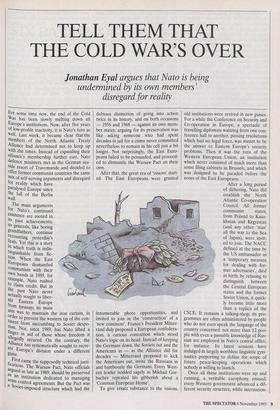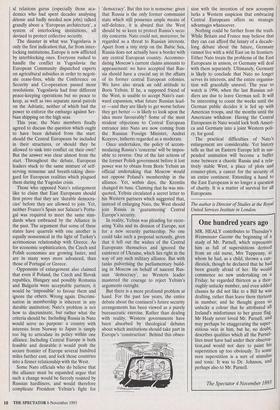TELL THEM THAT THE COLD WAR'S OVER
Jonathan Eyal argues that Nato is being undermined by its own members' disregard for reality
For some time now, the end of the Cold War has been slowly melting down all Europe's institutions. Now, after five years of low-profile inactivity, it is Nato's turn as Well. Last week, it became clear that the members of the North Atlantic Treaty Alliance had determined not to keep up With the times. Instead of expanding their alliance's membership further east, Nato defence ministers met in the German sea- Alliance has systematically sought to recre-
ate. has
division under a different guise.
First came the supposedly technical justi- tications, The Warsaw Pact, Nato officials argued as late as 1989, should be preserved as an institution dedicated to managing arms control agreements. But the Pact was a Soviet-imposed structure which had the
dubious distinction of going into action twice in its history, and on both occasions — 1956 and 1968 — against its own mem- ber states; arguing for its preservation was like asking someone who had spent decades in jail for a crime never committed nevertheless to remain in his cell just a bit longer. Not surprisingly, the East Euro- peans failed to be persuaded, and proceed- ed to dismantle the Warsaw Pact on their own.
After that, the great era of 'visions' start- ed. The East Europeans were granted innumerable photo opportunities, and invited to join in the 'construction' of a 'new continent'. France's President Mitter- rand duly proposed a European confedera- tion, a curious concoction which stood Nato's logic on its head. Instead of keeping the Germans down, the Soviets out and the Americans in — as the Alliance did for decades — Mitterrand proposed to kick the Americans out, invite the Russians in and bamboozle the Germans. Every West- ern leader nodded sagely as Mikhail Gor- bachev repeated his gibberish about a 'Common European Home'.
To give ersatz substance to the visions, old institutions were revived in new guises. For a while the Conference on Security and Co-operation in Europe, a spectacle of travelling diplomats waltzing from one con- ference hall to another, passing resolutions which had no legal force, was meant to be the answer to Eastern Europe's security problems. Then it was the turn of the Western European Union, an institution which never consisted of much more than some filing cabinets in Brussels, and which was designed to be paraded before the noses of the East Europeans.
After a long period of dithering, Nato did establish the North Atlantic Co-operation Council. All former communist states, from Poland to Kaza- khstan and Krgyzstan (and any other `stan' all the way to the Sea of Japan), were invit- ed to join. The NACC defined at the time by the US ambassador as a 'temporary measure for dealing with for- mer adversaries', died at birth: by refusing to distinguish between the Central European states and the former Soviet Union, it quick- ly became little more than a replica of the CSCE. It remains a talking-shop; its pro- grammes are often administered by people who do not even speak the language of the country concerned: not more than 12 peo- ple with even a passable knowledge of Rus- sian are employed in Nato's central office, for instance. Its latest sessions have indulged in largely worthless linguistic gym- nastics purporting to define the scope of future peace-keeping operations which nobody is willing to launch.
Once all these institutions were up and running, a veritable cacophony ensued: every Western government advanced a dif- ferent security structure, while internation- al relations gurus (especially those aca- demics who had spent decades analysing detente and badly needed new jobs) talked grandly about a `European architecture', a system of interlocking institutions, all devised to protect collective security.
The disaster in what was Yugoslavia is only the first indication that, far from inter- locking institutions, Europe is now afflicted by interblocking ones. Everyone rushed to handle the conflict in Yugoslavia: the European Community dispatched experts on agricultural subsidies in order to negoti- ate cease-fires, while the Conference on Security and Co-operation passed more resolutions. Yugoslavia had four different peace-keeping operations but no peace to keep, as well as two separate naval patrols on the Adriatic, neither of which had the power to enforce the embargo against Ser- bian shipping on the high seas.
This year, the Nato members finally agreed to discuss the question which ought to have been debated from the start: should the Central Europeans be included in their structures, or should they be allowed to sink into conflict on their own? But the answer was clear almost from the start. Throughout the debate, European leaders stuck to the same mixture of self- serving nonsense and breath-taking disre- gard for European realities which plagued them during the Yugoslav crisis.
Those who opposed Nato's enlargement like to claim that East Europeans should first prove that they are 'durable democra- cies' before they are allowed to join. Yet, neither Franco's Spain nor Salazar's Portu- gal was required to meet the same stan- dards when embraced by the Alliance in the past. The argument that some of these states have quarrels with one another is equally nonsensical in the light of Turkey's acrimonious relationship with Greece. As for economic sophistication, the Czech and Polish economies are growing faster, and are in many ways more advanced, than those of Portugal or Greece.
Opponents of enlargement also claimed that even if Poland, the Czech and Slovak republics, Hungary and possibly Romania and Bulgaria were acceptable partners, it would be 'impossible' to favour them and ignore the others. Wrong again. Discrimi- nation in membership is inherent in any durable institution; Nato's problem is not how to discriminate, but rather what the criteria should be. Including Russia in Nato would serve no purpose: a country with interests from Norway to Japan is simply too big to articulate its policy within one alliance. Including Central Europe is both feasible and desirable: it would push the secure frontier of Europe several hundred miles further east, and lock those countries into a firmer relationship with the West.
Some Nato officials who do believe that the alliance must be expanded argue that such a change would be fiercely resisted by Russian hardliners, and would therefore complicate President Yeltsin's fight for 'democracy'. But this too is nonsense: given that Russia is the only former communist state which still possesses ample means of self-defence, it is absurd that the West should be so keen to protect Russia's secu- rity concerns. Nato could not, moreover, be regarded as a threat to Russian interests. Apart from a tiny strip on the Baltic Sea, Russia does not actually have a border with any central European country. Accommo- dating Moscow's current claims amounts to appeasement: we have accepted that Rus- sia should have a crucial say in the affairs of its former central European colonies. We have also struck an odd attitude to Boris Yeltsin. If he, a supposed friend of the West, is unable to accept Nato's east- ward expansion, what future Russian lead- er —and they are likely to get worse before they get better — is likely to look upon the idea more favourably? Some of the most strident objections to Central European entrance into Nato are now coming from the Russian Foreign Minister, Andrei Kozyrev, hitherto regarded as a moderate.
Once undertaken, the policy of accom- modating Russia's 'concerns' will be impos- sible to reverse. One of the last actions of the former Polish government before it lost power was to obtain from Boris Yeltsin an official undertaking that Moscow Would not oppose Poland's membership in the alliance. Yet, within days, the Kremlin changed its tune. Claiming that he was mis- quoted, Yeltsin circulated a secret letter to his Western partners which suggested that, instead of enlarging Nato, the West should join Russia in 'guaranteeing' Central Europe's security.
In reality, Yeltsin was pleading for recre- ating Yalta and its division of Europe, not for a new security partnership. No one could take such a proposal seriously, given that it left out the wishes of the Central Europeans themselves and ignored the existence of Ukraine, which lies right in the way of any such military alliance. But with tanks pulverising the parliamentary build- ing in Moscow on behalf of nascent Rus- sian 'democracy', no Western leader mustered the courage to reject Yeltsin's arguments outright.
But there is a more profound problem at hand. For the past few years, the entire debate about the continent's future security arrangements has been viewed as a purely bureaucratic exercise. Rather than dealing with reality, Western governments have been absorbed by theological debates about which institutions should take part in Europe's 'construction'. Behind this obses- sion with the invention of new acronyms lurks a Western suspicion that embracing Central Europeans offers no strategic advantages whatsoever.
Nothing could be further from the truth.. While Britain and France may believe that they can can afford the luxury of a decade- long debate about the future, Germany cannot live with a wild East on its frontiers. Either Nato treats the problems of the East Europeans in unison, or Germany will deal with them separately. Ultimately, Germany is likely to conclude that Nato no longer serves its interests, and the entire organisa- tion will gracefully unravel. The year to watch is 1996, when the last Russian sol- diers are due to leave German soil. It will be interesting to count the weeks until the German public decides it is fed up with American troops, and the months until the Americans withdraw. Having the Central Europeans in Nato would lock both Ameri- ca and Germany into a joint Western poli- cy, for good.
The practical difficulties of Nato's enlargement are considerable. Yet history tells us that an Eastern Europe left in sus- pended animation will become a buffer zone between a chaotic Russia and a rela- tively stable West, a place of plots and counter-plots, a cancer for the security of an entire continent. Extending a hand to the East Europeans is no longer a question of charity. It is a matter of survival for all Europeans.
The author is Director of Studies at the Royal United Services Institute in London.











































































 Previous page
Previous page